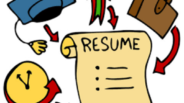Some rules for drafting a professional resume/CV.

When you apply for a job, entry level or top level, you are asked to send your resume. Professionally speaking, your resume is like a mirror which reflects a highlight of your education, origin background, professional career, your accomplishments & achievements and other details. By screening your CV, prospective employer finds your compatibility of the position applied and makes easy for the employer to gather data. But a CV full of typos, errors and cluttered information doesn’t create a good impression. Here are some useful tips to keep in mind while writing your resume:

Avoid typos – No one is going to give your resume a second glance if you write sentences like ‘I’m a carrier-oriented person’ and ‘I’m a graduate form.’ Typos on a job application can kill your prospective of landing a job. A sloppy resume means the applicant will do a sloppy job. Typos and spelling errors are not justifiable on a resume. A CV gives a first-hand account of a job seeker’s capabilities and experience. If he can’t pay attention to something as important as his resume, why should I believe he would treat my business with care?
Avoid confusing objectives and common phrases – Seeking a challenging position’ and ‘want to grow professionally’ are objectives for you. But what do you have to offer to the company? Your skills must bring him profit, and that’s what you must stress on.” Also avoid clichéd phrases like ‘proven track record’, ‘excellent communication skills’, ‘work well under pressure’, and ‘result-oriented’.
Avoid exaggerating – You might be tempted to exaggerate, or even lie, about your past. But remember that employers have tools to verify what’s written on the résumé. We always do background checks, track a person on social media and call for references before employing someone.
Restrict your résumé to minimum number of pages – There’s nothing called an ideal length to a résumé; as long as it justifies your qualification and experience, and doesn’t put your prospective employer to sleep, it’s fine. But then, it’s suggested that you limit yourself to a maximum of two pages. No one has the time to read an epic. Try to accommodate your qualification, past experiences, your skills and what value you can add to the company in two, or in rare cases, three pages. But also make sure you don’t miss out on important information in a bid to keep your résumé short.
Keep the format simple – Drafting a CV is not a painting competition, so keep the formatting simple and align the contents with appropriate spacing, usage of bullet points. Do not use very large fonts and keep the fonts readable. Avoid bold and italic fonts. Forget fancy, colourful and multiple fonts and jarring text sizes. Also forget centre alignment for texts and random bolding and italicing of copy. The idea is to keep the format simple, readable and visually appealing. Trying to beautify the résumé will only give the readers a headache.
Do not copy another person’s résumé – Know what is written on your CV, never paste your information on any copied CV. Your CV is all about you and your skills. Spend time on drafting a professional CV rather than copying it from other’s CV.
Do not take your CV just a formality, there should be weight age in your CV. It should not be either very lengthy or very brief. Maintain a balance while adding your professional details. In most of the interviews, your CV facilities your selection. Have a successful interview!

 Currency Convertor
Currency Convertor Post an article
Post an article Abhishek Sharma
Abhishek Sharma

 sending...
sending...




